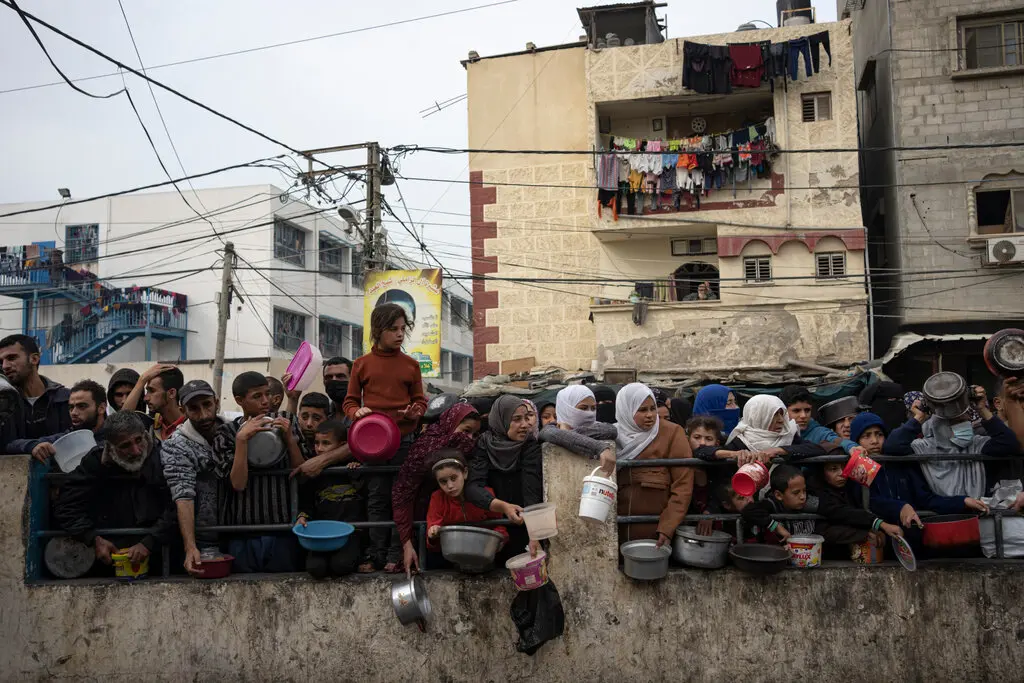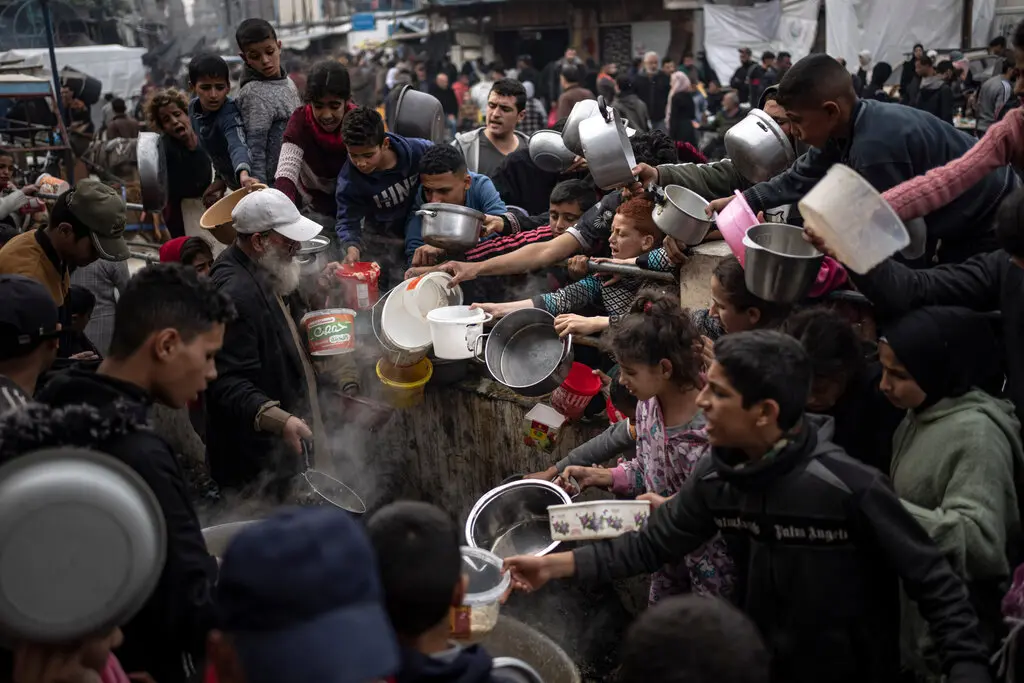For weeks, Walaa Zaiter’s four children have been experiencing hunger, yet she struggles to find sufficient food for them.
They yearn for sandwiches, fruit juice, and the homemade Palestinian dishes she used to prepare before the onset of the war. In a fleeting moment of internet access, she observed her children gathered around her phone, watching a YouTube video of someone relishing French fries.
In a recent telephone interview, Ms. Zaiter, 37, shared that the most they can hope for these days is a can of peas, some cheese, and an energy bar provided as a weekly ration by the United Nations in Rafah, a city in southern Gaza where they sought refuge in early December to escape Israeli bombardment in the north.
Unfortunately, it is far from sufficient to feed her family of seven.
“It’s a daily struggle,” she expressed. “You feel you are under pressure and hopeless, and you cannot provide anything.”
Israel’s war in Gaza has led to a humanitarian catastrophe, with half of the approximately 2.2 million population at risk of starvation, and 90 percent stating that they regularly go without food for an entire day, according to a recent United Nations report.
Arif Husain, chief economist at the World Food Program, described the humanitarian disaster in Gaza as one of the worst he had ever seen. The territory appears to meet at least the first criteria of a famine, with 20 percent of the population facing an extreme lack of food, he said.
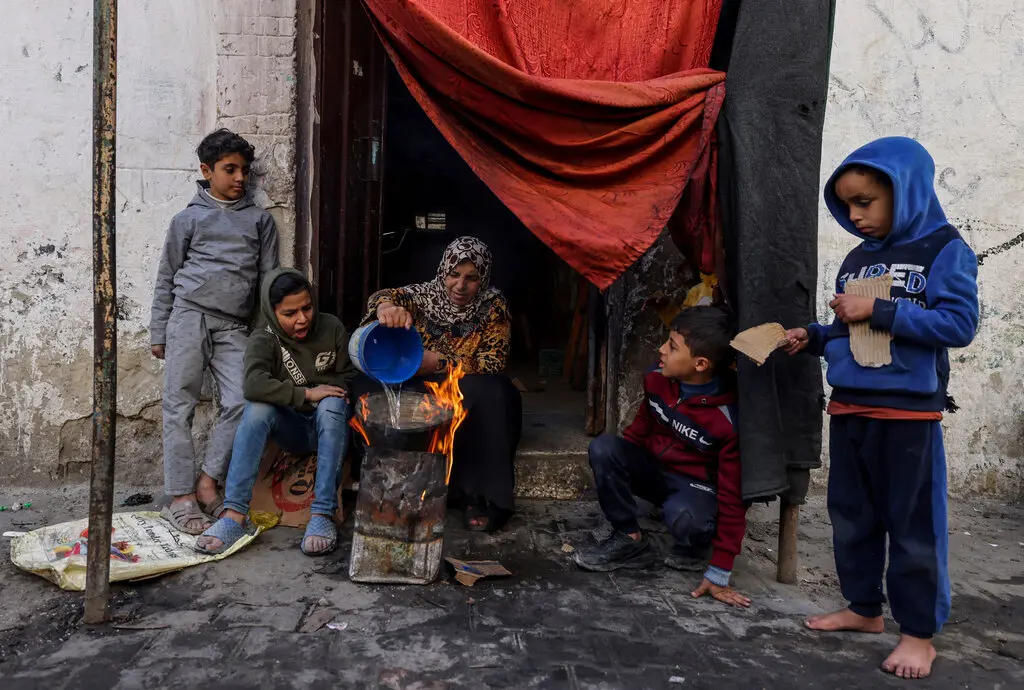
A Palestinian woman making food outside a house in southern Gaza last month.Credit...Mohammed Abed/Agence France-Presse — Getty Images
Arif Husain, chief economist at the World Food Program, stated, “I’ve been doing this for about 20 years. I’ve been to pretty much any conflict, whether Yemen, whether it was South Sudan, northeast Nigeria, Ethiopia, you name it. And I have never seen anything like this, both in terms of its scale, its magnitude, but also at the pace that this has unfolded.”
Eylon Levy, an Israeli government spokesman, asserted that Israel did not obstruct humanitarian assistance and blamed Hamas, the Palestinian group governing Gaza, for any shortages. He accused Hamas of seizing some aid for its own use. While no evidence was provided, Western and Arab officials have mentioned that Hamas is known to possess a substantial stockpile of supplies, including food, fuel, and medicine.
The war commenced on Oct. 7 after Hamas attacked Israel, resulting in an estimated 1,200 casualties, according to Israeli officials. In retaliation, Israel initiated a devastating air bombardment of the small, impoverished enclave, followed by a ground invasion displacing approximately 85 percent of the population.
The war has claimed over 20,000 Palestinian lives, according to the Gaza Health Ministry, and inflicted extensive damage on the territory’s civilian infrastructure and economy. Israel has maintained a siege on Gaza for months, severing access to most water, food, fuel, and medicine.
Philippe Lazzarini, the head of the United Nations agency aiding Palestinians, recounted witnessing desperately hungry Gazans intercept aid trucks in Rafah, raiding food supplies, and consuming them on the spot. Human Rights Watch has accused Israel of collectively punishing Gaza civilians for the actions of Hamas and of “using starvation of civilians as a method of warfare,” both potential war crimes.
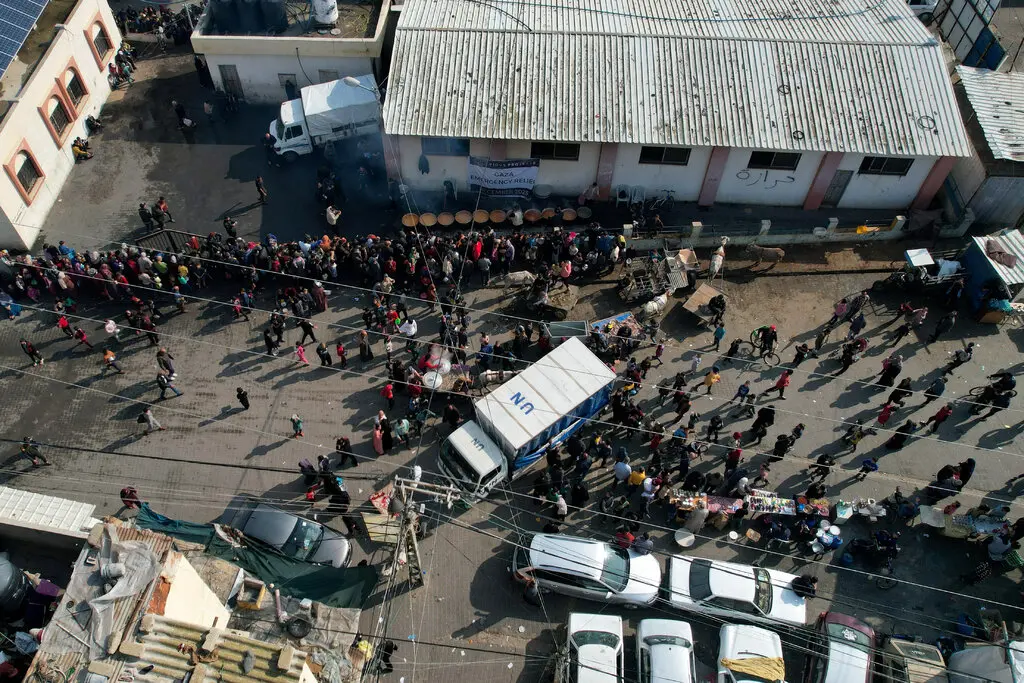
Palestinians gathering to receive food cooked by a charity kitchen in Rafah in December. Credit. - Reuters
Human Rights Watch’s Omar Shakir stated, “For over two months, Israel has been depriving Gaza’s population of food and water, a policy spurred on or endorsed by high-ranking Israeli officials and reflecting an intent to starve civilians as a method of warfare. World leaders should be speaking out against this abhorrent war crime, which has devastating effects on Gaza’s population.”
At the onset of the war, Israeli officials pledged to impose a complete siege on Gaza, with Defense Minister Yoav Gallant declaring on Oct. 9, “There will be no electricity, no food, no fuel, everything is closed. We are fighting human animals, and we are acting accordingly.” The initial two weeks saw no incoming aid, and even after that, fuel wasn’t permitted until Nov. 18.
In recent weeks, Israel has allowed around 100 to 120 trucks to enter Gaza daily, significantly fewer than the 500 trucks before the war and insufficient to meet the region’s needs, according to Dr. Guillemette Thomas of Doctors Without Borders.
Israeli government spokesman Eylon Levy countered allegations of obstructing aid, stating on Dec. 20, “We categorically reject the despicable and libelous allegations that Israel is somehow obstructing the delivery of humanitarian aid into Gaza. If they want more food and water to reach Gaza, they should send more food and water to Gaza. And while they’re sending more aid, they should condemn Hamas for hijacking aid deliveries and diverting them to its fighters. Their silence is shameful. We will not accept international officials deflecting blame onto us to cover up the fact they’re covering up for Hamas.”
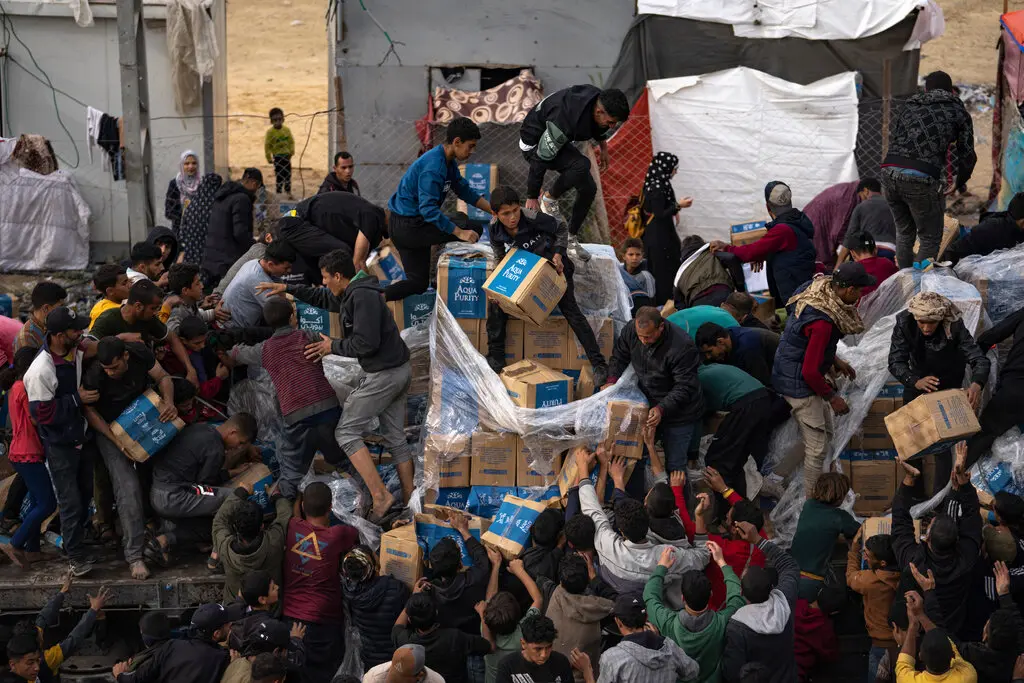
Desperate Palestinians looting a humanitarian aid truck as it crossed into Gaza in Rafah.Credit...Fatima Shbair/Associated Press
But Mr. Lazzarini said on Friday that it was “baseless misinformation” to blame the international community for the lack of aid into Gaza. He said deliveries were “limited in quantities and riddled with logistical hurdles” imposed by Israel.
Those include a complicated and lengthy verification process, a ban on the delivery of commercial goods to markets and private businesses, and restricted access to much of Gaza, either because of airstrikes, fighting or Israeli military checkpoints.
Gaza spiraled so quickly into humanitarian catastrophe when the war began because it had already been deep in crisis for many years.
Israel and Egypt imposed a blockade on the territory after Hamas seized power in 2007, largely cutting off Gaza’s economic activity with the outside world. The blockade made up to 80 percent of Gazans reliant on humanitarian aid even before the war, the United Nations said.
Azmi Keshawi, an analyst for the research organization International Crisis Group, said that even if Israel says it does not view its war as one against Gaza’s population, it is civilians who are paying the heaviest price.
“Our daily nightmare is to go hunt for food,” said Mr. Keshawi, who fled his home in Gaza City in the north and now lives in a tent on a sidewalk in Rafah with his children. One of his children was injured by an Israeli airstrike, he said.
“You cannot find flour,” he said. “You cannot find yeast to make bread. You cannot find any kind of food — tomatoes, onions, cucumbers, eggplant, lemon, orange juice.”
When food can be found for sale, he said, the prices have skyrocketed. In Rafah, a sack of flour that might have cost $13 before the war now sells for $138 to $165.
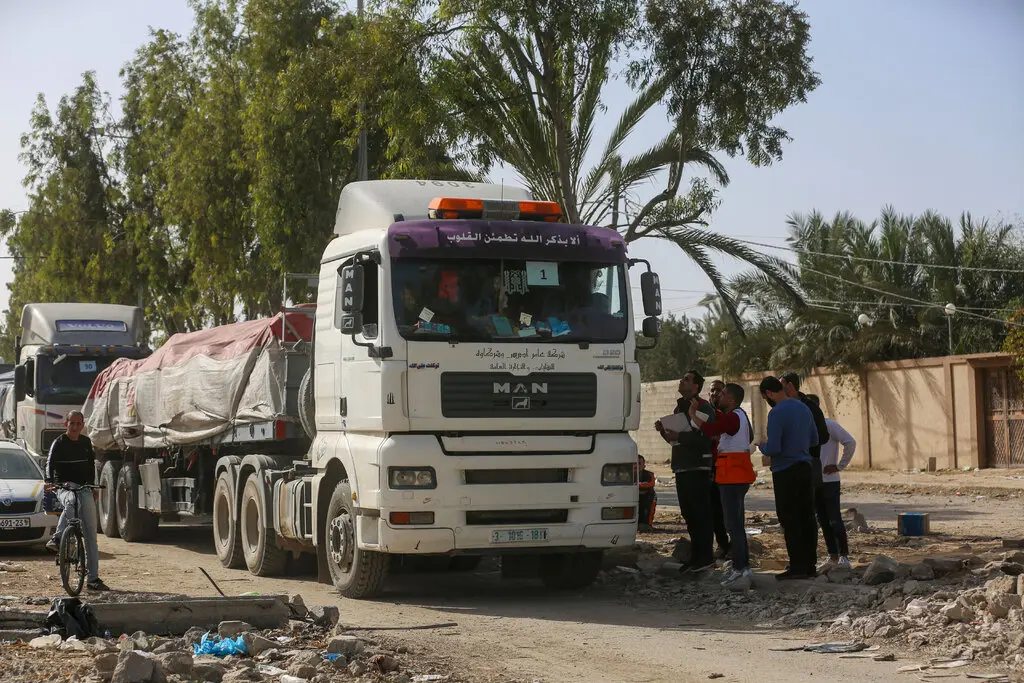
Humanitarian aid trucks and ambulances entering northern Gaza through an Israeli checkpoint in November.Credit...Samar Abu Elouf for The New York Times
Thousands of displaced individuals who sought refuge in Rafah, now considered one of the few safe zones in Gaza, are grappling with soaring prices for essential items. Basic goods like a can of tuna, once priced below 30 cents, now exceed $1.50, while a can of corned beef, previously around $1.40, has surged to over $5.50, creating financial hardship for those who left their homes with minimal resources.
Survival has become a daunting challenge for many, as highlighted by Tahrir Muqat, 46, who fled Gaza City and resides in a school in Maghazi refugee camp. In this makeshift shelter with limited access to regular running water, residents resort to storing water in toilet bowls when available. Muqat waits in long lines daily for aid, receiving only two packs of feta cheese and three crackers. Subsequently, she and her relatives go door-to-door seeking scraps from dilapidated houses packed with displaced people.
The desperation is palpable, with Muqat recounting encounters where people reject them, often with insulting comments about rising costs since their arrival. In distressing scenes, she observed children resorting to eating rotten tomatoes found on the streets. Tragically, last month, an airstrike hit nearby during their quest for sustenance, injuring Muqat’s daughter, Nasayem, who now struggles with shrapnel wounds and limited medical resources in their unheated shelter. Despite the harsh conditions, Nasayem remains focused on securing food for her baby in the face of adversity.
